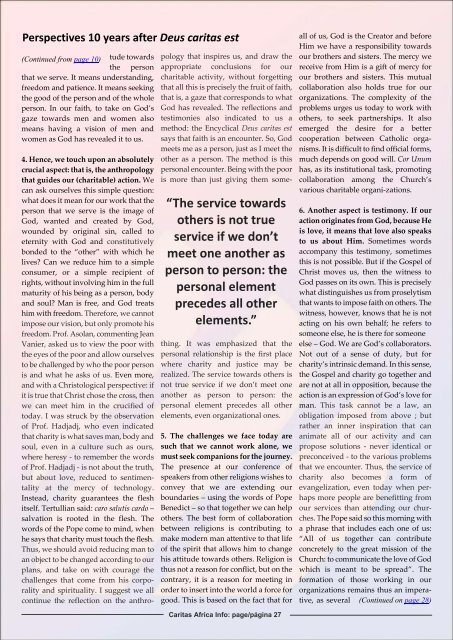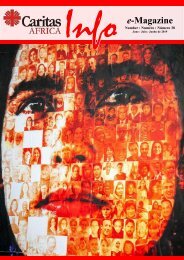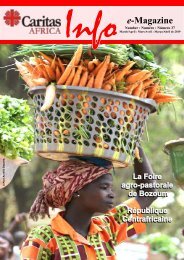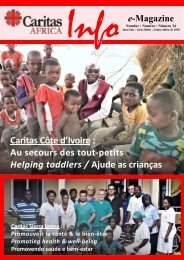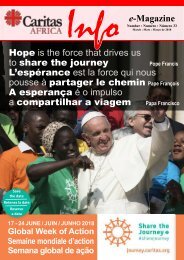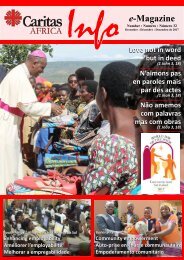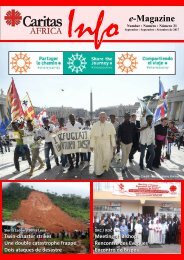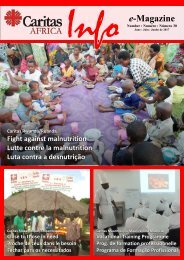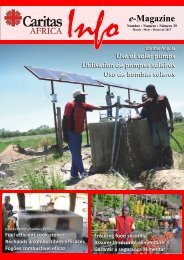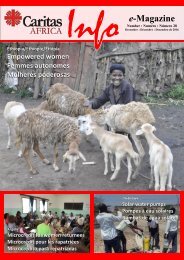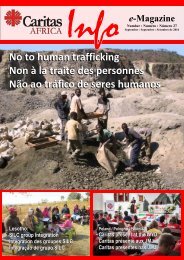You also want an ePaper? Increase the reach of your titles
YUMPU automatically turns print PDFs into web optimized ePapers that Google loves.
Perspectives 10 years after Deus caritas est<br />
(Continued from page 10) tude towards<br />
the person<br />
that we serve. It means understanding,<br />
freedom and patience. It means seeking<br />
the good of the person and of the whole<br />
person. In our faith, to take on God’s<br />
gaze towards men and women also<br />
means having a vision of men and<br />
women as God has revealed it to us.<br />
4. Hence, we touch upon an absolutely<br />
crucial aspect: that is, the anthropology<br />
that guides our (charitable) action. We<br />
can ask ourselves this simple question:<br />
what does it mean for our work that the<br />
person that we serve is the image of<br />
God, wanted and created by God,<br />
wounded by original sin, called to<br />
eternity with God and constitutively<br />
bonded to the “other” with which he<br />
lives? Can we reduce him to a simple<br />
consumer, or a simple recipient of<br />
rights, without involving him in the full<br />
maturity of his being as a person, body<br />
and soul? Man is free, and God treats<br />
him with freedom. Therefore, we cannot<br />
impose our vision, but only promote his<br />
freedom. Prof. Asolan, commenting Jean<br />
Vanier, asked us to view the poor with<br />
the eyes of the poor and allow ourselves<br />
to be challenged by who the poor person<br />
is and what he asks of us. Even more,<br />
and with a Christological perspective: if<br />
it is true that Christ chose the cross, then<br />
we can meet him in the crucified of<br />
today. I was struck by the observation<br />
of Prof. Hadjadj, who even indicated<br />
that charity is what saves man, body and<br />
soul, even in a culture such as ours,<br />
where heresy - to remember the words<br />
of Prof. Hadjadj - is not about the truth,<br />
but about love, reduced to sentimentality<br />
at the mercy of technology.<br />
Instead, charity guarantees the flesh<br />
itself. Tertullian said: caro salutis cardo –<br />
salvation is rooted in the flesh. The<br />
words of the Pope come to mind, when<br />
he says that charity must touch the flesh.<br />
Thus, we should avoid reducing man to<br />
an object to be changed according to our<br />
plans, and take on with courage the<br />
challenges that come from his corporality<br />
and spirituality. I suggest we all<br />
continue the reflection on the anthro-<br />
“The service towards<br />
others is not true<br />
service if we don’t<br />
meet one another as<br />
person to person: the<br />
personal element<br />
precedes all other<br />
elements.”<br />
pology that inspires us, and draw the<br />
appropriate conclusions for our<br />
charitable activity, without forgetting<br />
that all this is precisely the fruit of faith,<br />
that is, a gaze that corresponds to what<br />
God has revealed. The reflections and<br />
testimonies also indicated to us a<br />
method: the Encyclical Deus caritas est<br />
says that faith is an encounter. So, God<br />
meets me as a person, just as I meet the<br />
other as a person. The method is this<br />
personal encounter. Being with the poor<br />
is more than just giving them something.<br />
It was emphasized that the<br />
personal relationship is the first place<br />
where charity and justice may be<br />
realized. The service towards others is<br />
not true service if we don’t meet one<br />
another as person to person: the<br />
personal element precedes all other<br />
elements, even organizational ones.<br />
5. The challenges we face today are<br />
such that we cannot work alone, we<br />
must seek companions for the journey.<br />
The presence at our conference of<br />
speakers from other religions wishes to<br />
convey that we are extending our<br />
boundaries – using the words of Pope<br />
Benedict – so that together we can help<br />
others. The best form of collaboration<br />
between religions is contributing to<br />
make modern man attentive to that life<br />
of the spirit that allows him to change<br />
his attitude towards others. Religion is<br />
thus not a reason for conflict, but on the<br />
contrary, it is a reason for meeting in<br />
order to insert into the world a force for<br />
good. This is based on the fact that for<br />
all of us, God is the Creator and before<br />
Him we have a responsibility towards<br />
our brothers and sisters. The mercy we<br />
receive from Him is a gift of mercy for<br />
our brothers and sisters. This mutual<br />
collaboration also holds true for our<br />
organizations. The complexity of the<br />
problems urges us today to work with<br />
others, to seek partnerships. It also<br />
emerged the desire for a better<br />
cooperation between Catholic organisms.<br />
It is difficult to find official forms,<br />
much depends on good will. Cor Unum<br />
has, as its institutional task, promoting<br />
collaboration among the Church’s<br />
various charitable organi-zations.<br />
6. Another aspect is testimony. If our<br />
action originates from God, because He<br />
is love, it means that love also speaks<br />
to us about Him. Sometimes words<br />
accompany this testimony, sometimes<br />
this is not possible. But if the Gospel of<br />
Christ moves us, then the witness to<br />
God passes on its own. This is precisely<br />
what distinguishes us from proselytism<br />
that wants to impose faith on others. The<br />
witness, however, knows that he is not<br />
acting on his own behalf; he refers to<br />
someone else, he is there for someone<br />
else – God. We are God’s collaborators.<br />
Not out of a sense of duty, but for<br />
charity’s intrinsic demand. In this sense,<br />
the Gospel and charity go together and<br />
are not at all in opposition, because the<br />
action is an expression of God’s love for<br />
man. This task cannot be a law, an<br />
obligation imposed from above ; but<br />
rather an inner inspiration that can<br />
animate all of our activity and can<br />
propose solutions - never identical or<br />
preconceived - to the various problems<br />
that we encounter. Thus, the service of<br />
charity also becomes a form of<br />
evangelization, even today when perhaps<br />
more people are benefitting from<br />
our services than attending our churches.<br />
The Pope said so this morning with<br />
a phrase that includes each one of us:<br />
“All of us together can contribute<br />
concretely to the great mission of the<br />
Church: to communicate the love of God<br />
which is meant to be spread”. The<br />
formation of those working in our<br />
organizations remains thus an imperative,<br />
as several (Continued on page 28)<br />
Caritas Africa Info: page/página 27


